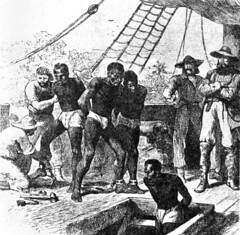AMSCO United States History 2015 Edition, Chapter 1 A New World of Many Cultures, 1491-1607
| 13930062298 | Maize | An early form of corn grown by Native Americans. In addition to beans and squash was the most important element of Central American diets. |  | 0 |
| 13930062318 | encomienda system | King of Spain gave grants of land and natives (as slaves) to individual Spaniards as reward for seizing the wealth of Indian empires in the Americas |  | 1 |
| 13930062319 | asiento system | This system required that a tax be paid to the King of Spain, for slaves that were imported to the Americas(p. 8)Slaves had to be imported when the native population decreased due to Europeans' disease and brutality. |  | 2 |
| 13930062304 | Incas | This highly developed civilization developed a vast South American empire based in Peru. |  | 3 |
| 13930062305 | Aztecs | Starting about 1300, this civilization flourished in central Mexico; capital at Tenochtitlan |  | 4 |
| 13930062320 | conquistadores | These Spanish explorers and conquerors of the Americas sent ships loaded with gold and silver back to Spain making it the richest and most powerful nation in Europe. (p. 8) |  | 5 |
| 13930062321 | Hernan Cortes | He conquered the Aztecs in Mexico. |  | 6 |
| 13930062322 | Francisco Pizarro | He conquered the Incas in Peru. |  | 7 |
| 13930062306 | New Laws of 1542 | Bartolome de Las Casas convinced the King of Spain to institute these laws, which ended American Indian slavery, ended forced Indian labor, and began the process of ending the encomienda systems. |  | 8 |
| 13930062307 | Roanoke Island | In 1587, Sir Walter Raleigh attempted to establish a settlement here, but it failed. |  | 9 |
| 13930062308 | printing press | This invention in the 1450s spread knowledge across Europe. |  | 10 |
| 13930062323 | Ferdinand and Isabella | They united Spain, defeated and drove out the Moors. In 1492, they funded Christopher Columbus's voyage to America. |  | 11 |
| 13930062324 | Protestant Reformation | In the early 1500s, certain Christians in Germany, England, France, Holland, and other northern European countries revolted against the authority of the pope in Rome. |  | 12 |
| 13930062309 | Henry the Navigator | The monarch of Portugal who financed/encouraged exploration |  | 13 |
| 13930062325 | Christopher Columbus | He spent 8 years seeking financial support for his plan to sail west from Europe to the "Indies". In 1492, he sailed from the Canary Islands to an island in the Bahamas. His success in discovering lands on the other side of the ocean brought him a burst of glory in Spain. |  | 14 |
| 13930062326 | Treaty of Tordesillas (1494) | In 1494, this treaty between Spain and Portugal, moved the line of demarcation that the pope had established a few degrees to the west. | 15 | |
| 13930062327 | nation-state | In the 15th century, small kingdoms and multiethnic empires were being replaced by these. They were countries in which the majority of people shared a common culture and common loyalty toward a central government. |  | 16 |
| 13930062312 | Iroquois Confederation | A political union of five independent American Indian tribes in the Mohawk Valley of New York. |  | 17 |
| 13930062328 | John Cabot | An Italian sea captain who sailed under contract to England's King Henry VII. He explored the coast of Newfoundland in 1497. |  | 18 |
| 13930062329 | Jacques Cartier | In the period for 1534 to 1542, he explored the St. Lawrence River. |  | 19 |
| 13930062330 | Samuel de Champlain | He established the first permanent French settlement at Quebec, a fortified village on the St. Lawrence River. |  | 20 |
| 13930062331 | Henry Hudson | This English sailer was hired by the Dutch government to seek a westward passage to Asia through North America. In 1609, while searching for the passage, he sailed up a broad river that would later be named the Hudson River. |  | 21 |
| 13930062313 | Bartolome de Las Cases | A Spanish priest who was an advocate for better treatment of Indians. |  | 22 |
| 13930062314 | Valladolid Debate | In 1550-1551, in Valladolid, Spain, a formal debate concerning the role of American Indians in the Spanish colonies. |  | 23 |
| 13930062315 | Juan Gines de Sepulveda | In the Valladolid Debate, this Spaniard argued that the American Indians were less than human. |  | 24 |
| 13930062316 | Anasazi | This civilization of the Southwest corner of North America adapted to its arid environment by carving out irrigation systems and large housing complexes out of solid rock | 25 | |
| 13930062317 | Pueblo People | People of the desert who lived in the "Four Corners" region; forced to migrate due to volcanoes and drought. | 26 |

